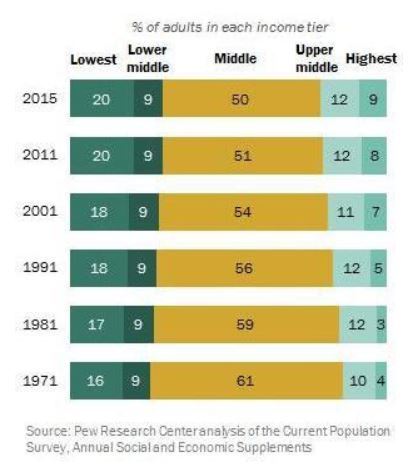A Holiday Note to Congress:
Half of Your Country is In or Near Poverty
By Paul Buchheit
December 14, 2015 "Information
Clearing House" -
Recent
reports have
documented the growing rates of
impoverishment in the U.S., and new information surfacing in the
past 12 months shows that the trend is continuing, and probably
worsening.
Congress should be filled with guilt — and shame —
for failing to deal with the enormous wealth disparities that are
turning our country into the equivalent of a 3rd-world nation.
Half of Americans Make Less than a Living Wage
According to the
Social Security Administration, over half of Americans make less
than $30,000 per year.
That’s less than an appropriate average living
wage of $16.87 per hour, as calculated by
Alliance for a Just Society (AJS), and it’s not enough —
even with two full-time workers — to attain an “adequate but
modest living standard” for a family of four, which at
the median is over $60,000, according to the
Economic Policy Institute.
AJS also found that there
are 7 job seekers for every job opening that pays
enough ($15/hr) for a single adult to make ends meet.
Half of Americans Have No Savings
A study by
Go Banking Rates reveals that nearly 50 percent of Americans
have no savings. Over 70 percent of us have less than $1,000.
Pew Research supports this finding with survey results that show
nearly half of American households spending more than they earn. The
lack of savings is particularly evident with young adults, who went
from a five-percent
savings rate before the recession to a negative savings
rate today.
Emmanuel Saez and Gabriel Zucman
summarize: “Since the bottom half of the distribution always owns
close to zero wealth on net, the bottom 90% wealth share is the same
as the share of wealth owned by top 50-90% families.”
Nearly Two-Thirds of Americans Can’t Afford to
Fix Their Cars
The
Wall Street Journal reported on a
Bankrate study, which found 62 percent of Americans without the
available funds for a $500 brake job. A
Federal Reserve survey found that nearly half of respondents
could not cover a $400 emergency expense.
It’s continually getting worse, even at
upper-middle-class levels. The
Wall Street Journal recently reported on a JP Morgan study’s
conclusion that “the bottom 80% of households by income lack
sufficient savings to cover the type of volatility observed in
income and spending.”
The Middle Class Is Disappearing

This chart from
Pew Research shows the dramatic shrinking of the middle class,
defined as “adults whose annual household income is two-thirds to
double the national median, about $42,000 to $126,000 annually in
2014 dollars.”
Market watchers rave about
‘strong’ and even
‘blockbuster’ job reports. But any upbeat news about the
unemployment rate should be balanced against the fact that nine of
the ten fastest growing
occupations don’t require a
college degree. Jobs gained since the recession
are paying
23 percent less than jobs lost.
Low-wage jobs (under $14 per hour) made up just 1/5 of the jobs
lost to the recession, but accounted for nearly 3/5 of the jobs
regained in the first three years of the recovery.
Furthermore, the official 5%
unemployment rate is nearly 10% when short-term
discouraged workers are included, and
23% when long-term discouraged workers are included. People are
falling fast from the ranks of middle-class living. Between 2007 and
2013 median wealth dropped a shocking
40
percent, leaving the poorest half with debt-driven negative
wealth.
Members of Congress, comfortably nestled in bed
with millionaire friends and corporate lobbyists, are in denial
about the true state of the American middle class. The once-vibrant
middle of America has dropped to lower-middle, and it is still
falling.
Paul Buchheit is a college teacher with formal
training in language development and cognitive science. He is the
founder and developer of social justice and educational websites (UsAgainstGreed.org,
RappingHistory.org, PayUpNow.org), and the editor and main author of
"American Wars: Illusions and Realities" (Clarity Press). He can be
reached at paul@UsAgainstGreed.org.